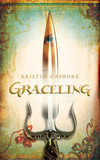
I enjoyed Graceling more than I actually expected to. It starts out slowly and ends a bit abruptly, but there was something about it that kept me going right to the end.
Plotwise, the story starts with main character Katsa kicking ass as a sort of enforcer for the King. She’s not thrilled with the idea, but what choice does she have? Halfway through the story, she meets Po and ends up running off to what feels like a completely different plotline (although to be fair, they are tangentially related by way of Po’s grandfather. They end up on the run from Mad King Bad Guy, cross some mountains… and then the story sort of ends. It’s not a terrible story, but I felt like it was a bit light at times and tended to drop things without warning.
The magical aspects worldbuilding is interesting, although I’m not completely sure how much I actually like it. The basic idea is that there are relatively rare people born with Graces–essentially one thing or another that a person is superhumanly good at. A perfect memory. Swimming like a fish. Not having to sleep. Reading minds. Fighting. It’s an interesting idea, but it’s also a bit too fluid for my tastes. The Graces aren’t well defined. Even if you think you know what your Grace does, you might be wrong. And they tend to change or grow over time. Perhaps it’s the sort of thing you’re more into, but it’s not for me.
The rest of the worldbuilding isn’t particularly interesting to the point of being unbelievable. The kingdoms are literally named Middluns, Nander, Wester, Estill, and Sunder. The other two–Monsea and Lienid–are at least slightly better. Also, one of the characters we meet later in the book and spend a decent chunk of time with is named Bitterblue. But why… Other than that, there’s really not much to the worldbuilding. It’s basic psuedo-European fantasy like we’ve seen time and time again. So it goes.
Characterwise, I didn’t particularly care for Katsa (the main character) at first. She’s abrasive to just about everyone. She absolutely hates mind readers for reasons that are never entirely clear. At least once she meets Po, she lightens up a bit. I like Po. He’s funny and a good counterpart to Katsa. Bitterblue is amusing and probably a bit too old feeling for her age. King Bad Guy makes a pretty good villain, although there’s not really any complexity to him, which is a bummer.
Overall, it’s a fun read and well worth it. I look forward to the sequels.
Finally, I wanted to know a bit more:
King Randa just sort of becomes irrelevant halfway through the book. What’s goingt o happen tehre?
Where did King Leks come from?
What’s with the Graces changing over time? How do Graces even work?
What’s going to happen next? At least there are sequels.
Side note: Other reviews seem to be absolutely obsessed with either the feminist underpinnings in this book or the premarital sex. They’re almost as interesting to read as the book itself–just to see how two different people can get completely different things out of the same text. People are strange sometimes.